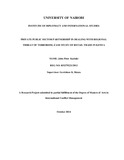| dc.description.abstract | Terrorism has impacted heavily on public and private sectors both directly and indirectly. Some sectors however have experienced a higher magnitude of effects than others. The retail sector in Kenya is one of them and is currently re-aligning its strategies and has embraced safety and security of its customers as one of its major priorities in order to maintain their competitive edge in the retail market business. The study highlights the need for public private partnership in dealing with the threat of terrorism and the need to investigate the state of current security arrangement within the retail sector. It is upon this background that this study seeks to establish the private public sector partnership in dealing with regional threat of terrorism with special focus to retail trade in Kenya. The study utilizes both primary and secondary sources of information. Primary data is derived from interactive interviews and administration of questionnaires from staff in retail sector in Kenya, Ministry of Defense, National treasury and Ministry of internal security. Secondary data is sourced from a collection and review of published and unpublished materials, journals, academic papers, periodicals and expenditures. From the critical data analysis, the study reveals that terrorist activities, political unrest and other economic or political uncertainties negatively affect the performance of retail business operations and that terrorism has significantly inflicted fear among stake holders in the retail trade thus causing increase in prices of commodities in retail trade.
The study concludes that the weak partnership between public sector and retail sectors has had negative impact in managing terrorism and that the current state on security between public sector and retail sectors in managing terrorism is fragile. The study recommends that imposing regulatory measures like increasing accountability and transparency on bank accounts including the lifting of bank confidentiality laws would help to prevent terrorist events. Therefore, the study recommends policy adjustment and encourages partnership between public and retail sectors in managing terrorism. Further to that, the Government should seek ways to improve its ability to identify, penetrate and dismantle terrorist plots through structural reforms; consequently, there is need to develop new intelligence and law enforcement tools and approaches that value information sharing, communication between private sector and the government in order to encourage prevention of terrorism related crimes. There is also the need to enhance Greater regional cooperation and coordination as this can help in mitigating extremist incitement and terrorist activities throughout the East African region. | en_US |

